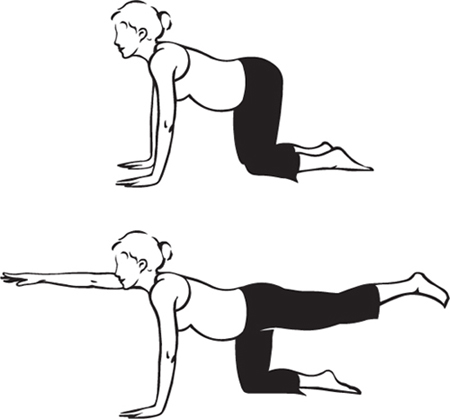Grandma’s Remedy
If you want to avoid using medication,
try a folk remedy. If you experience foot odor, spray some
antiperspirant on your feet—it helps reduce odor and may prevent skin
cracking.
7. You Should Also Know
Hearing Your Baby’s Heartbeat
It may be possible to hear your baby’s
heartbeat with a stethoscope at 20 weeks. Before we had doppler
equipment to hear the heartbeat and ultrasound to see the heart
beating, a stethoscope helped the listener hear the baby’s heartbeat.
This usually occurred after quickening for most women.
The sound you hear through a stethoscope
may be different than what you’re used to hearing at the office. It
isn’t loud. If you’ve never listened through a stethoscope, it may be
difficult to hear at first. It does get easier as the baby gets larger
and sounds become louder.
If you can’t hear your baby’s heartbeat
with a stethoscope, don’t worry. It’s not always easy for a healthcare
provider who does this on a regular basis!
If you hear a swishing sound
(baby’s heartbeat), you have to differentiate it from a beating sound
(mother’s heartbeat). A baby’s heart beats rapidly, usually 120 to 160
beats every minute. Your heartbeat or pulse rate is slower, in the
range of 60 to 80 beats a minute. Ask your healthcare provider to help
you distinguish the sounds.
Could You Have Osteoporosis?
Osteoporosis is a bone disease in which
bones lose density and the spaces within them grow larger, resulting in
increased chance of breakage. It’s typically diagnosed in older,
postmenopausal women. However, it’s now being diagnosed in younger
women.
We believe low-calorie diets, excessive
exercise and drinking lots of diet soda may be possible causes. In
addition, low body weight, anemia and amenorrhea (menstruation stops)
may add to the problem. Your lifestyle may put you at risk. Women who
smoke or drink a lot of alcohol may increase that risk.
Osteoporosis at a young age can be
serious. Bones may become so thin they actually break. In later years,
osteoporosis may be severe.
If you believe you may have a
problem, talk to your healthcare provider about it. If you do have
osteoporosis, it could have an effect on you during your pregnancy.
West Nile Virus (WNV)
West Nile virus (WNV) is spread to
humans by mosquito bites. If you get WNV, you may have no symptoms; 80%
of those with West Nile virus never develop symptoms. Or you
may get West Nile fever or severe West Nile disease. It’s estimated
that 20% of people who become infected with WNV will develop West Nile
fever.
Symptoms appear within 3 to 14 days after
being bitten and include fever, headache, fatigue, swollen lymph nodes
and body aches. A skin rash on the torso appears occasionally. While
the illness can be as short as a few days, even healthy people have
reported being sick for several weeks.
Symptoms of severe disease, also called West Nile encephalitis or meningitis or West Nile poliomyelitis,
include headache, high fever, neck stiffness, stupor, disorientation,
coma, tremors, convulsions, muscle weakness and paralysis. These
symptoms may last several weeks.
We don’t know what percentage of WNV
infections during pregnancy result in infection of the unborn child or
medical problems in newborns. The CDC and state and local health
departments record birth effects among women who had West Nile virus
during pregnancy.
There is no treatment for WNV infection.
If the illness is diagnosed, a detailed ultrasound can be done to
evaluate the fetus for structural abnormalities. This should be done 2
to 4 weeks after onset of the illness.
If you’re pregnant and live in an area
with WNV, use caution to lower your risk. Avoid mosquito-infested
areas, use screens on windows and doors, wear protective clothing and
use an EPA-registered repellent (one that has been reviewed for safety
by the U.S. Environmental Protection Agency). You can use insect
repellent containing DEET. There have been no reported harmful events
following use of repellents containing DEET in women or their babies.
The CDC also recommends using picaridin on skin and clothing, and
permethrin on clothing. Oil of lemon eucalyptus is another recommended
option, but it isn’t as long-lasting.
If you become ill, call your
healthcare provider. If he or she believes you may have contracted the
illness, diagnostic testing can be done. After baby’s birth, if you
have symptoms of West Nile virus, don’t breastfeed.
8. Exercise for Week 20
Kneel on your hands and knees, with your
wrists directly beneath your shoulders and your knees directly beneath
your hips. Keep your back straight. Contract your tummy muscles, then
extend your left leg behind you at hip height. At the same time, extend
your right arm at shoulder height. Hold 5 seconds, and return to the
kneeling position. Repeat on your other side. Start with 4 repetitions
on each side, and gradually work up to 8. Strengthens buttocks muscles, back muscles and leg muscles.
